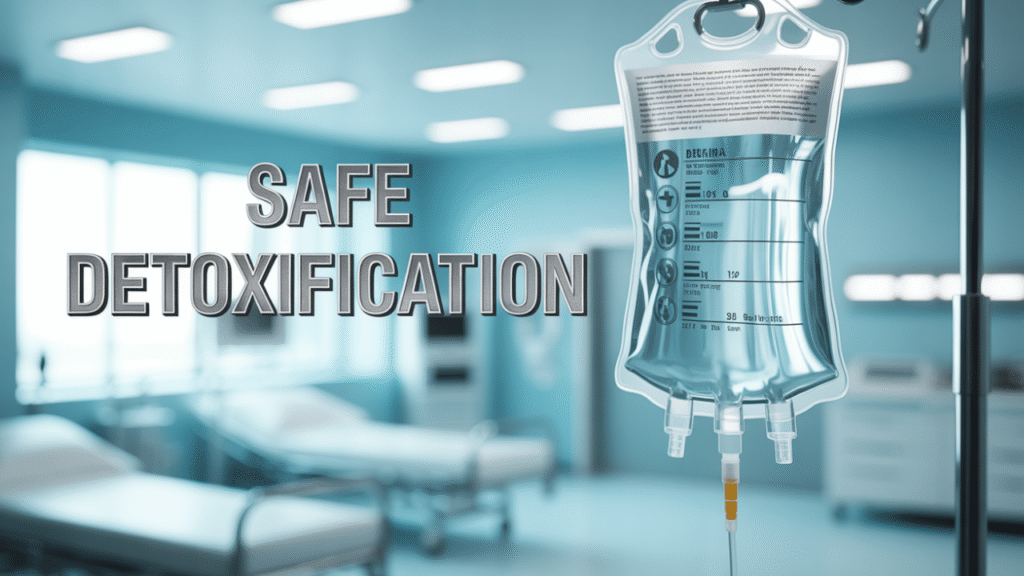Putting Your Safety First on the Road to Recovery
Detoxification, or “detox,” is often the first step toward breaking free from addiction. It’s the process of removing harmful substances like drugs or alcohol from the body. While detox is a sign of progress, it can also be physically and emotionally intense. That’s why going through it alone or without medical help can be risky—even life-threatening.
Medical supervision during detox isn’t just helpful—it’s essential. With the right care, you can stay safe, ease symptoms, and begin your healing with the support you deserve.
In this article, we’ll explore why professional supervision matters, the dangers of unsupervised detox, and how medical teams can support you during this critical phase of recovery.
What Happens During Detox?
When you stop using substances your body has become dependent on, it reacts. Your brain, nervous system, and organs must adjust without the chemicals they’ve relied on.
This process often triggers withdrawal symptoms, which vary depending on the substance, how long you’ve used it, and your physical health.
Common symptoms include:
- Nausea and vomiting
- Sweating and chills
- Muscle aches
- Anxiety and depression
- Insomnia
- Seizures or hallucinations (in severe cases)
According to the National Institute on Drug Abuse (NIDA), detox alone does not treat addiction, but it is an important early step that should always be done with proper support to manage complications and prepare for further care (NIDA, 2020).
Why Medical Supervision Matters
Medical supervision provides a safe, structured environment where trained professionals can monitor your physical and emotional health 24/7. This is especially important if you’ve been using substances that cause dangerous or unpredictable withdrawal symptoms, such as alcohol, benzodiazepines, or opioids.
Let’s explore the key reasons why medical supervision is so important.
1. Prevents Life-Threatening Complications
Some substances cause withdrawal symptoms that can be fatal without medical intervention.
For example:
- Alcohol withdrawal can lead to delirium tremens (DTs), which includes confusion, hallucinations, seizures, and a rapid heartbeat. DTs have a mortality rate of up to 37% when untreated (Mayo Clinic, 2021).
- Benzodiazepine withdrawal can cause life-threatening seizures or psychosis.
- Opioid withdrawal is rarely fatal, but it can cause severe dehydration, heart issues, and relapse due to unbearable discomfort.
In a medically supervised detox, professionals can monitor your vital signs, provide emergency care if needed, and adjust medications to reduce risk.
2. Eases Withdrawal Symptoms with Medication
Medical detox often includes medication-assisted treatment (MAT) to ease discomfort, reduce cravings, and lower the risk of relapse.
Some examples include:
- Benzodiazepines to reduce alcohol withdrawal symptoms
- Buprenorphine or methadone for opioid detox
- Anti-nausea or sleep aids to help manage physical symptoms
A 2017 report by the Substance Abuse and Mental Health Services Administration (SAMHSA) shows that MAT during detox significantly improves patient outcomes and increases the chances of completing treatment (SAMHSA, 2017).
3. Provides Emotional and Mental Health Support
Detox doesn’t only affect the body—it also brings up strong emotions like fear, guilt, anxiety, and depression. For some, it can trigger suicidal thoughts or emotional trauma.
Having trained professionals available can:
- Offer counseling or emotional support
- Adjust medications for mental health symptoms
- Connect you to long-term therapeutic care
You’re not just treated as a body going through withdrawal—you’re supported as a whole person.
4. Reduces Risk of Relapse During Withdrawal
Without supervision, the discomfort of detox often pushes people back to using—not because they don’t want recovery, but because they’re trying to escape the pain.
Medical supervision:
- Manages symptoms more effectively
- Offers encouragement and safety
- Helps create a plan for continued treatment after detox
A study published in Journal of Addiction Medicine found that people who detoxed with medical supervision were more than twice as likely to stay in recovery compared to those who detoxed on their own (Wakeman et al., 2019).
5. Creates a Bridge to Long-Term Recovery
Detox is the beginning, not the end. A medical detox center can help you transition into therapy, support groups, or residential treatment without delay.
This connection to ongoing care is critical, as most relapses happen within the first 90 days after detox if there’s no follow-up support.
What to Expect in a Medically Supervised Detox
Every detox facility is a little different, but most offer the following:
- 24/7 medical monitoring
- Individualized treatment plan based on your history and health
- Access to medications to manage symptoms
- Nutritional and hydration support
- Mental health care for anxiety, depression, or trauma
- Referrals for continued treatment or therapy
These services aren’t just for emergencies—they’re part of a holistic, compassionate approach to care.
Who Needs Medically Supervised Detox?
While anyone can benefit from supervision, it is especially critical for those who:
- Have been using alcohol, benzodiazepines, or opioids regularly
- Have a history of seizures or heart problems
- Have co-occurring mental health disorders
- Have previously experienced severe withdrawal
- Have tried detoxing alone and relapsed
If you’re unsure, speak with a healthcare provider. They can help assess your risk and recommend the safest course of action.
Final Thoughts
Choosing detox is an act of courage. You’ve made the decision to step into recovery—and that deserves to be met with care, safety, and support.
Medical supervision ensures that your detox is not only safer but also more effective. It eases the journey, protects your health, and gives you a solid foundation for long-term healing.
You don’t have to go through this alone. You deserve professionals by your side—guiding, supporting, and celebrating every step toward your new life.
Because recovery isn’t just about surviving detox—it’s about reclaiming your future.

